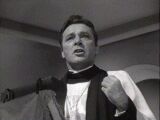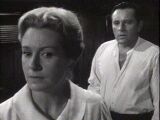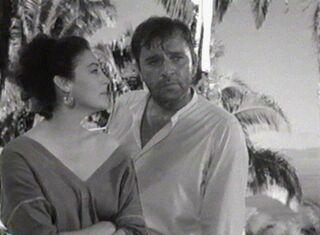The Night of the Iguana
1964 US
Dir: John Huston
Str: Richard Burton, Ava Gardner, Deborah Kerr,
Sue Lyon
Left:Ava Gardne, Right:Richard Burton
This schizophrenic movie is somewhat
different from other movies
based upon Tennesse Williams' plays.
This extremely beautiful black & white film is based upon
Tennessee Williams' writing. However, compared to other movies based upon his plays such as "A Streetcar Named
Desire"(1951), "Cat on a Hot Tin Roof"(1958), "Suddenly Last Summer"(1959) and "Summer
and Smoke"(1961), this one is filled with schizophrenic tendency while others are depicting in quite a paranoiac
manner a person or a group of persons who have paranoiac proclivity. Although "schizophrenic" might sound
quite exaggerated, and I somewhat admit there is some exaggeration here, but as I think it's a quite convenient
word to simplify and clarify the point of what I want to say, I've decided to use this word in this review. Anyway,
as far as I know, among movies based upon Tennessee Williams' plays, "The Night of the Iguana" and "Sweet
Bird of Youth"(1962) are only movies that have schizophrenic tendency, though the latter isn't so schizophrenic
as this one.
The schizophrenic tendency of this movie is revealed as early as in
the first scene.
At this point, usually I explain the story of the movie I'm reviewing.
But, as for this movie, there is no need for doing it. Because it is quite loosely structured as to the plot line,
and there is no special plot development in this schizophrenic movie. This schizophrenic tendency is revealed as
early as in the first scene where Richard Burton frenetically delivers a sermon in a charch, a sermon that afterwards
Ava Gardner refers as an atheist's sermon. And, the figure shown in the title back, i.e. a figure of an iguana
against the background of moon night, has a mesmerizing effect. This deformed figure of an iguana presages this
movie's schizophrenic expressions and none-dependancy on centrality, and completely and violently severs our expectation
that story should have some consistent plot line and some form of centrality upon which all the elements of the
story should converge. In short, there is no doubt in that these two figures (Richard Burton and an iguana) in
the earlier scenes succeed in tactfully establishing the overall inclination for this movie's schizophrenic proceedings.
And, this movie relentlessly retain this tendency to the last except the very last scene (I explain this later).
In this movie, Richard Burton is talking like a comedian and his
demeanor is like a clown, and, therefore, his speech leads us
to
nowhere.
For example, if you carefully hear what the main character of this movie Richard
Burton says, you will certainly notice that he is talking like a comedian and his demeanor is like a clown despite
the fact that this movie never even pretends to be a comedy. Furthermore, all the conversations in this movie never
accumulate anything and never lead us to anywhere. This point will become clearer if you compare the conversations
in this movie with the ones in, say, "Cat on a Hot Tin Roof". In the latter, every time some member of
Paul Newman's family makes conversation with another member, they accumulate and charge emotional momentum. Thus,
through the proceedings of the plot line, somehow repressed energy is gradually and constantly accumulated, and
when the amount of energy has reached a certain threshold, it explodes and, at the same time, this explosion constitutes
some sort of catharsis. Conversely to this rather traditional scheme, "The Night of the Iguana" doesn't
accumulate anything. Richard Burton's clown-like behavior proves that whatever he is saying diffuses in the air
the instant he speaks. Therefore, whatever he speaks never relates to any corresponding emotional contents and
context, and for this reason, in this movie there is no centrality around which all the conversation contexts coagulate.
The presence of Deborah Kerr and his grandfather add
some further nomadic and therefore somewhat schizophrenic flavor
to this already schizophrenic movie.
Furthermore, it can be said that Deborah Kerr and his grandfather
add some further nomadic and therefore somewhat schizophrenic flavor to this already schizophrenic movie. They
are wandering around all over the world drawing sketches and reciting self-made poems. When they arrived at the
hotel run by Eva Gardner, they don't have any money left. Without referring to such eminent contemporary thinkers
as Gilles Deleuze and Felix Guattari, it's obvious that this way of nomadic life is schizophrenic compared to the
life of sedentary agricultual races. One of the most impressive scenes in this movie is the one where Deborah Kerr
cut the head of a fish off making steady thump sound with a determined and accurate handling. This sound is so
effective and so startling as to remind us the fact that her presence is not the one we usually expect for ordinary
housewives whose typical image is such as sitting tight in their own houses, cooking and cleaning for their husbands.
At the end of this movie, she further continue her own itinerant life alone (her grandfather dies soon after he
has completed his last poem) and she even declines Richard Burton's offer of accompanying her and Ava Gardner's
offer of the chance of running, in place of her and along with Richard Burton, the hotel she owns and settling
down. But her nomadic dispositon never allows her to take these offers. Therefore, her attitude is quite consistent
with her character. Apart from these two main characters, there are also other characters who shows some dose of
out-of-ordinary, if not schizophrenic, inclination. Even Eva Gardner who owns two beach boys in order to quench
her sexual desire (two is important in this respect) have this inclination, and it's also true to charming Sue
Lyon who always tries to escape from her possessive chaperon. It is easily guessed that with these characters,
there will happen no such serious emotional conflicts as we can witness in movies based upon other Tennessee Williams'
plays, and even if it happens, it will never last so long as to accumulate and form anything substantial.
One point I can't understand about this movie is why Richard Burton accepts Ava Gardner's offer of settling down.
But, one point I can't understand about this movie is the last scene where
Richard Burton accepts the aforementioned Ava Gardner's offer of running her hotel in place of her. As I mentioned
above, Deborah Kerr declines this offer and this perfectly matches her disposition. Nevertheless, Richard Burton
who shares the same disposition accepts it. Whenever I watch this movie, I always feel some strangeness and suddenness
for this last scene. Compared to music, it is like a modern atonal music has suddenly ended with a consonant polyphony.
And, only this point I don't like in this otherwise stunning movie. But, other than this, this movie is absoletely
marvelous and has indescribable addictiveness, though I'm not so sure whether it is because of its schizophrenic
tendency. Additionally saying, the images of the tropical land captured in this movie is incredibly beautiful,
and at the same time, extraordinary in its literal meaning. It seems that somehow deformed form of flora and fauna
(remember the figure of the iguana) shown in this movie succeeds in letting us concentrate on the aspects of pure
object forms, and distract us from our usual ways of linear causal thinking. Although I used the word "schizophrenic"
quite frequently in this review, I have no intention of suggesting that this movie is sick and morbid. On the contrary,
anyone has more or less the tendency toward out-of-ordinariness, even if as to the way how she or he satisfies
it she or he can definitely be sick and morbid. Sometimes we have to stop the flow of ordinary life and enter into
somewhat schizophrenic reverie of, say, carnivals. Likewise, this movie has this quality of quenching our desire
for out-of-ordinariness. Anyway, the bottom line is that I regard "The Night of the Iguana" as one of
the best movies John Huston ever made, and I wonder why I don't find any substantial articles about this movie
in any movie reviews I've so far read.







